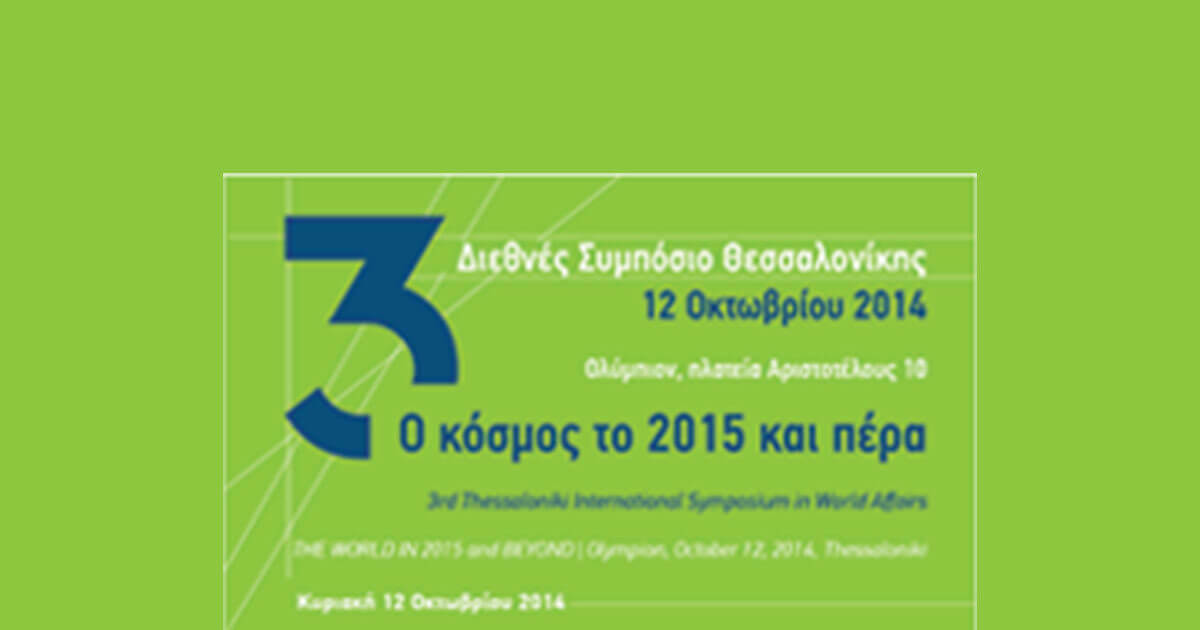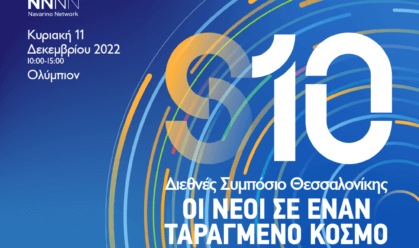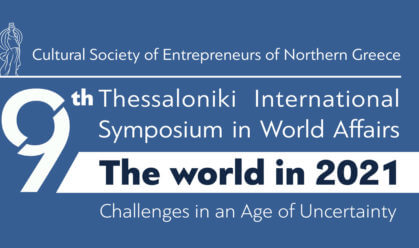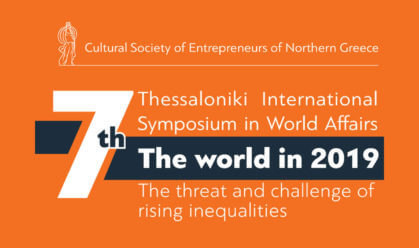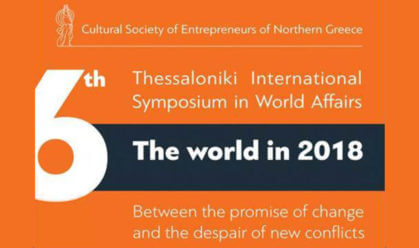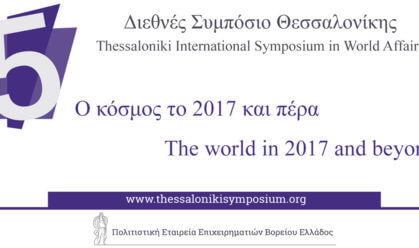| Sunday 12/10/2014 | |
| 10:00 | Registration
 |
| 10:30-11:00 | Introduction
Dimitris Keridis, Director, Navarino Network
Susanna Vogt, Head of Greece Office, Konrad-Adenauer-Stiftung
Nikos Efthymiadis, Former President, Northern Greece Entrepreneurs Cultural SocietyWelcoming remarks
Yiannis Boutaris, Mayor of Thessaloniki
 |
11:00-12:00
| ” A vision for Europe “ |
 | Keynote address byElmar Brok, Member of the European Parliament,
Chairman of the European Parliament Committee on Foreign Affairs
Introduced by
Giorgos Anastassopoulos, former Vice President of the European Parliament

Speaker’s short bio
Elmar Brok has been a member of the European Parliament since 1980. He serves as Chairman of the Committee on Foreign Affairs and member of the Committee on Constitutional Affairs. Elmar Brok also served as a representative for the European Parliament at the Intergovernmental Conferences for the EU Constitutional Treaty (2003/2004), the Treaty of Amsterdam (1996/97), the Treaty of Nice (2000), the Treaty of Lisbon (2007), the Council’s Reflection Group preparing the Maastricht Treaty and the negotiations on the report by the four presidents “Towards a Genuine Economic and Monetary Union” (since September 2012). Moreover, at a national level he is a member of the National Board of the Christian Democratic Union (CDU). In 2010 he supported the new initiative of the Spinelli Group in the European Parliament, which was founded to restore the effort for a Federal European Union. On November 16th 2013, he was elected President of the Union of European Federalists. |
| 12:00-13:30 | ” Europe and the Balkans 100 years after World War I “ |
 | Laza Kekic,
Regional Director for Europe, Economist Intelligence Unit

Speaker’s short bio
Laza Kekic is Regional Director, Central & Eastern Europe and Director of Country Forecasting Services, at the Economist Intelligence Unit (EIU), London. He heads the EIU’s regional team of analysts who provide economic, political and business coverage for all the countries of Europe. He also heads the EIU’s Country Forecasting Services, which include the EIU’s main traditional product, the Country Reports, as well as the Country Forecasts (forecasts and analysis for 82 countries aimed at direct investors). Areas of main specialisation and interest are: European affairs, Russia, the Balkans and other transition economies, foreign direct investment, economic forecasting, growth economics, and political development. He has written extensively for the Economist Intelligence Unit and other outlets on these topics. Laza is also a frequent speaker at Economist and external conferences and seminars. He was educated at the London School of Economics (BSc and MSc Econ) and joined the Economist Intelligence Unit in 1993. |
 | Gerald Knaus,
Founding chairman, European Stability Initiative
Speaker’s short bio
Gerald Knaus is the founding chairman of the European Stability Initiative (ESI). After having studied in Oxford, Brussels and Bologna, he taught economics at the State University of Chernivtsi in Ukraine and spent five years working for NGOs (including Crisis Group) and international organisations in Bulgaria and Bosnia and Herzegovina. From 2001 to 2004, he was the director of the Lessons Learned Unit of the EU Pillar of the UN Mission in Kosovo. In 2011, he wrote “Can Intervention Work?” with Rory Stewart. He co-authored more than 70 ESI reports as well as scripts for 12 TV documentaries on South East Europe. He is a founding member of the European Council on Foreign Relations and Associate Fellow at the Carr Center for Human Rights Policy at Harvard University’s Kennedy School, where he was a Visiting Fellow in 2010/2011 lecturing on state building and intervention. He lives in Istanbul and Paris.
|
| | Moderated by
Nikos Zaharis, Director, South-East European Research Center
 |
| 13:30-14:30 | Lunch break |
| 14:30-15:30 | ” Germany in Europe “ |
 | Andreas Roedder,
Historian, Professor at the University of Mainz
Introduced by
Susanna Vogt

Speaker’s short bio
Andreas Roedder has been a Professor of Modern History at the Johannes Gutenberg-Universitat Mainz since 2005, focusing on international history in the 19th and 20th centuries. His main fields of interests cover the history of the Conservatives in mid-Victorian England, German history and international politics in the inter-war period as well as in post-War Europe, the European revolutions and German re-unification of 1989/90 and the change of values in 20th century Western societies. Professor Rodder gained his Staatsexamen from the University of Tubingen in 1991 and his PhD from the University of Bonn in 1995. He taught as an Assistant and Associate Professor at the University of Stuttgart, where he gained his Habilitation in 2001. He was Visiting Fellow at the Historisches Kolleg in Munich (2001/02) and Visiting Professor at Brandeis University, MA. In 2012/13 he was Gerda Henkel Visiting Professor at the London School of Economics and the German Historical Institute London. He is currently working on a book bearing the working title “History of the Present Age”, trying to explain crucial current problems out of a historical and global perspective. |
15:30-17:00
| ” The crisis in Ukraine: What next? “ |
 | Kataryna Wolczuk,
Reader in Politics and International Studies, University of Birmingham\
Introduced by
Susanna Vogt

Speaker’s short bio
Kataryna Wolczuk is Reader in Politics and International Studies at the Centre for Russian, European and Eurasian Studies (CREES), the University of Birmingham. She holds an MA in Law from the University of Gdansk, Poland, an MSocSc and a PhD from the University of Birmingham. Her research has focused on state-building in the post-Soviet states, relations between the European Union and the post-Soviet states, as well as Russia’s policy in its neighbourhood. She has extensive experience of working with international organisations, think tanks, governments and international media and has travelled extensively in the post-Soviet region. Her publications include: K. Wolczuk, The Moulding of Ukraine: Constitutional Politics of State Formation, Central European University Press (2002) and R. Dragneva and K.Wolczuk (eds), Eurasian Economic Integration: Law, Policy, and Politics (Edward Elgar, 2013). |
| 17:00-17:30 | Coffee-break |
| 17:30-19:30 | ” Is the euro-crisis over? The challenges ahead “ |
 | Daniel Gros,
Director, Centre for European Policy Studies (recorded message)
Speaker’s short bio
Daniel Gros has been the Director of the Centre for European Policy Studies (CEPS) since 2000. Among other current activities, he serves as adviser to the European Parliament and is a member of the Advisory Scientific Committee of the European Systemic Risk Board (ESRB) and the Euro 50 Group of eminent economists. He has held past positions at the IMF and the European Commission, and served as advisor to several governments, including the UK and the US at the highest level. He is editor of Economie Internationale and International Finance. Daniel Gros holds a PhD. in economics from the University of Chicago and is the author of several books and numerous articles in scientific journals. His main areas of expertise are the European Monetary Union, macroeconomic policy, economics of transition to a market economy, public finance, banking and financial markets. |
 | Miranda Xafa,
CEO, E.F. Consulting Ltd, Former member of the IMF Executive Board (recorded message)
Speaker’s short bio
Miranda Xafa started her career at the International Monetary Fund in Washington in 1980, where she focused on stabilization programs in Latin America. In 1991-93 she served as chief economic advisor to the government of Prime Minister Mitsotakis in Athens, and subsequently worked as a financial market analyst in London and Athens. After serving as a member of the board of the IMF in Washington in 2004-09, she worked as senior investment strategist and member of the advisory board of I.J. Partners in Geneva, and is now CEO of E.F. Consulting in Athens. She holds a Ph.D. in Economics from the University of Pennsylvania and has taught economics at the Universities of Pennsylvania and Princeton. She has published several articles and papers on international economic and financial issues. |
 | Michael Massourakis,
Chief economist, Alpha Bank
Speaker’s short bio
Michael Massourakis joined Alpha Bank in 1996 and he is currently the Chief Economist. He graduated from the Athens University (1975). He continued his graduate studies at the American University, Washington D.C. (M.A.1979) and at the Graduate Center of the City University of New York (PhD 1983). He worked as an Adjunct Lecturer in Economics at Hunter College, New York (1981-1983), an Economist at the International Monetary Fund, Washington D.C. (1983-1987), and a Senior Economist at the Council of Economic Advisors, Athens, Greece (1987-1996). Between 1988-1996, he also served as an Alternate Member representing Greece at the E.U. Monetary Committee. Moreover, between 2000-2004, he served as a Member of the Board of the Capital Market Committee, the supervisory authority of the capital markets in Greece. He is President of the Scientific Committee of the Greek Federation of Banks, a member of the Executive Committee and the Board of Directors of the Institute of Economic and Industrial Research (IOBE), and a member of the Advisory Committee of the Greek Statistical Authority. |
 | Wolfango Piccoli,
Managing director, Teneo Intelligence
Speaker’s short bio
Wolfango Piccoli isa Managing Director with Teneo Intelligence, a political risk consultancy and advisory firm. Based in London, he serves as director of research and also covers political risk in Europe, with a special focus on Italy, Greece and Turkey. Prior to joining Teneo, Dr. Piccoli was the director of the London office and head of the Europe practice at Eurasia Group, where he was responsible for advising financial, corporate and government clients on political developments in Europe. Dr. Piccoli is a frequent commentator on European politics in major media outlets, including the IHT, the FT, CNN International, CNBC, BBC, Bloomberg, CNBC Europe and Al-Jazeera English. He also co-authored the book ‘Turkey at the Crossroads: Ottoman Legacies and a Greater Middle East’, which was translated into Turkish. Dr. Piccoli holds a Ph.D. in International Politics from the University of Wales, Aberystwyth, and an M.A. in International Relations from Bilkent University (Ankara). |
| | Moderated by
Dimitris Keridis
 |



